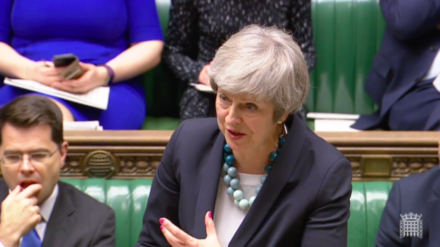
1. The government will delay the vote via “discourteous” means.
In a clear example of why Labour wanted to keep John Bercow in his place despite bullying allegations, the Speaker put on show his interventionist style again by warning that it would be “discourteous” for the government not to put the delay itself to a vote. He explained that there are two ways to pull the vote. The first, “preferable” option, would be for a minister to move that the debate be adjourned, which entails a vote. The second option is for the government to decline to move today’s business.
“Allowing the house to have its say would be the right and obvious course to take,” Bercow said. But the government has other plans. The Prime Minister’s spokesman explained that the clerk will read the orders of the day, then the Tory whip will say “tomorrow” (which doesn’t mean the debate will actually continue tomorrow). No vote is then required.
2. We still don’t know when the deal will be put to a vote in the Commons…
May refused to say when the meaningful vote, no longer being held on Tuesday, will instead take place. She did repeatedly say she was “deferring” the vote, which would imply a meaningful vote will occur at some point, and her spokesman confirmed this could be described as a “cast iron guarantee”.
The question is before or after Christmas. As the government’s strategy is presumably to apply as much pressure as possible to MPs with the looming threat of a ‘no deal’ exit, it would make sense to hold the vote later than sooner. And it’s unlikely that anyone will want to cancel or shorten Christmas recess, which runs from 20th December to 7th January.
3. …but it could be as late as 28th March.
On multiple occasions speaking in the chamber, May cited her deadline for coming back to the Commons with a deal as 21st January. But this may not be right. According to the House of Commons, which hosted a helpful #AskTheCommons Q&A session on Twitter this afternoon, the latest date for the government to ratify a deal would be 28th March.
It would appear that Theresa May has got the details of her deadline wrong, and could put her deal to a vote even closer to the exit date. What we do know is that the government continues to insist it will not extend Article 50, despite the European Court of Justice ruling today that it can be unilaterally revoked.
Now the Government has made a statement that political agreement on withdrawal agreement & future framework has been reached, the requirements for the Government to make a statement to the House by 21 Jan on ‘no deal’ has been superseded. (1/2) #AskTheCommons
— UK House of Commons (@HouseofCommons) December 10, 2018
4. May is only seeking “reassurances” from the EU.
May’s statement more or less confirmed that she would only be seeking “reassurances” from EU leaders, which likely means changes to the wording of the political declaration (the document describing the UK-EU future relationship). To reopen the withdrawal agreement would be too risky as “fishing would come back into play”, her spokesman said. Borrowing from Jeremy Corbyn’s table-themed trick, the PM said “nothing is off the table”, but this seems only to be an attempt to keep Tory MPs hopeful.
5. Labour will not back the deal if only cosmetic changes are made.
In his response to the statement, Corbyn told MPs that the House of Commons “must debate the negotiating mandate” if Theresa May plans to go back to Brussels. The Labour leader also made clear that his party would not support a deal if only small changes were made to the political declaration. There is “no point” in May “bringing back the same botched deal”, either next week or in January, he said.
Without official Labour backing, Theresa May will have to rely on Labour MPs being fearful enough of a ‘no deal’ Brexit that they would rebel and vote for her deal. But unless the level of Tory opposition significantly reduces, there doesn’t appear to be enough Caroline Flints in the PLP to make this strategy work.
Bonus:
If you were wondering whether Labour will now be tabling a motion of no confidence in the government, that looks unlikely – despite more and more Labour MPs demanding it. A party spokesperson has said the motion will be put down “when we judge it most likely to be successful”, and a well-placed source tells LabourList the leader’s office doesn’t think it wise to pull that card before the deal has been defeated.




More from LabourList
‘Labour won’t win back left defectors with squeeze messaging alone’
‘Help shape the next stage of Labour’s national renewal through the 2026 NPF consultation’
‘AI regulation is key to Labour’s climate credibility’